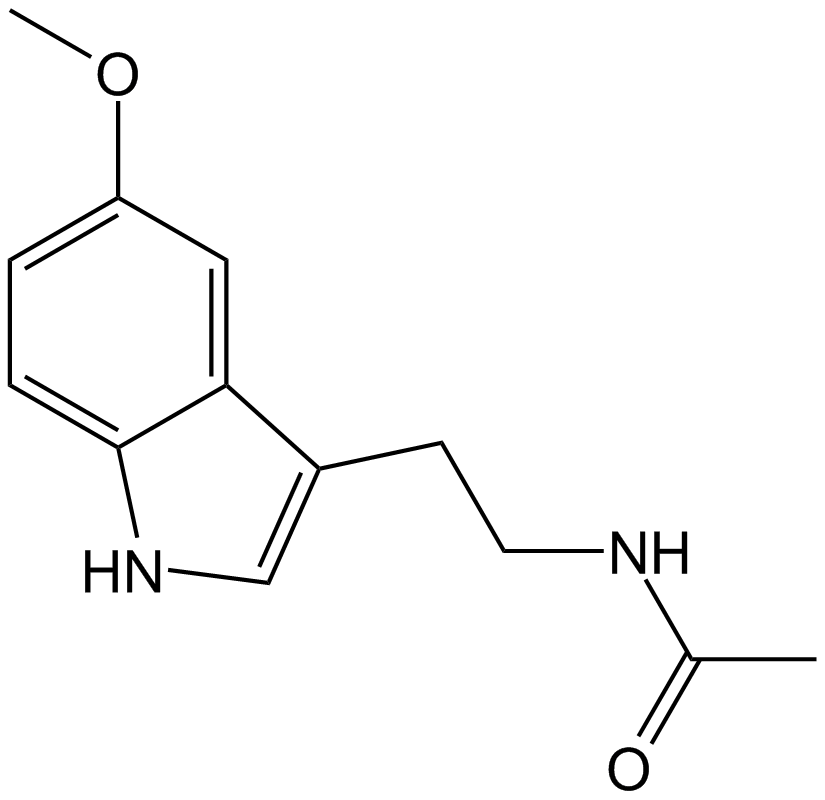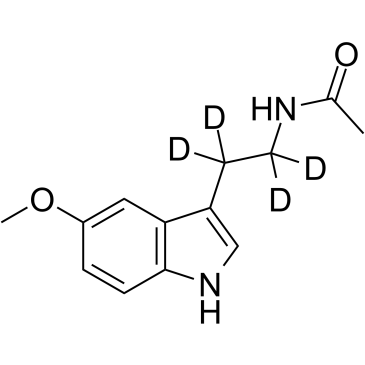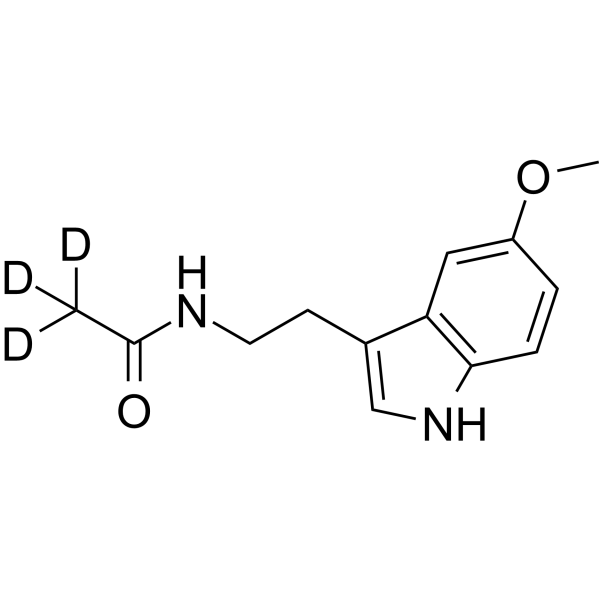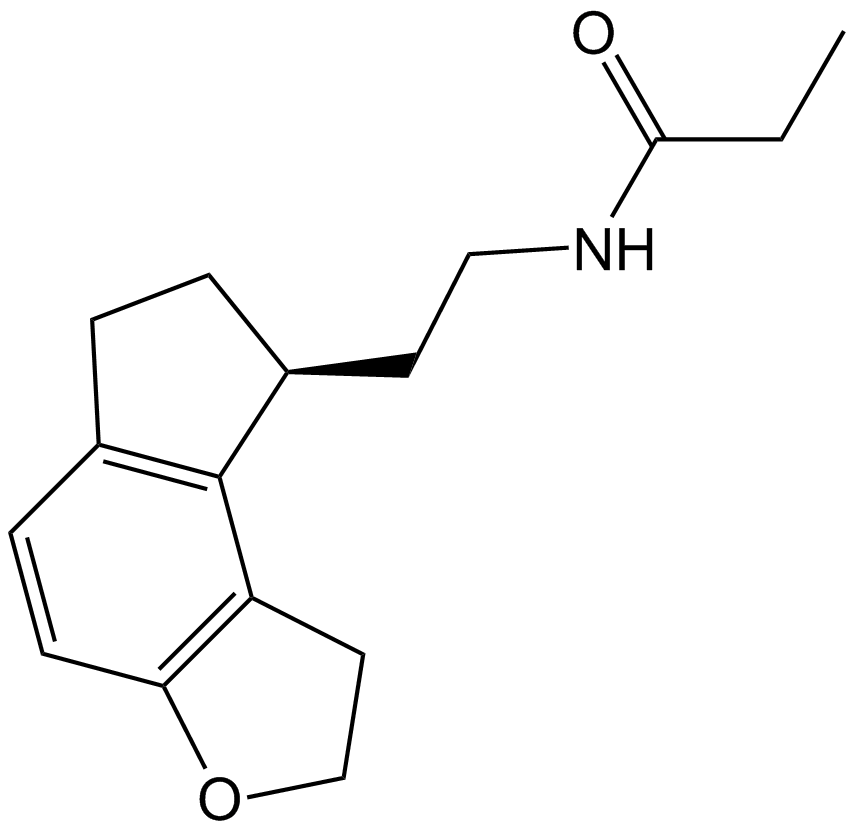Melatonin Receptors
Melatonin Receptor is a G protein-coupled receptor (GPCR) which binds melatonin. Three types of melatonin receptor have been cloned. The MT1 and MT2 receptor subtypes are present in humans and other mammals, while an additional melatonin receptor subtype MT3 has been identified in amphibia and birds. The MT1 subtype's expression in the pars tuberalis of the pituitary gland and suprachiamatic nuclei of the hypothalamus is indicative of melatonin's circadian and reproductive functional involvement. The MT2 subtype's expression in the retina is suggestive of melatonin's effect on the mammalian retina occurring through this receptor. Research suggests that melatonin acts to inhibit the Ca2+-dependent release of dopamine. Melatonin's action in the retina is believed to affect several light-dependent functions, including phagocytosis and photopigment disc shedding.
Produkte für Melatonin Receptors
- Bestell-Nr. Artikelname Informationen
-
GC14690
2-Iodomelatonin
2-Iodomelatonin ist ein potenter Agonist des Melatonin-Rezeptors 1 (MT1) mit einem Ki-Wert von 28 pM, es ist 5-fach selektiver fÜr MT1 als fÜr MT2. 2-Iodmelatonin kann verwendet werden, um Melatonin-Bindungsstellen im Gehirn und peripheren Geweben zu identifizieren, zu charakterisieren und zu lokalisieren.

-
GC11288
2-Phenylmelatonin
N-acetyl-5methoxy-2phenyl Tryptamine
2-Phenylmelatonin ist ein Melatonin (MT)-Membranrezeptoragonist mit hoher AffinitÄt.
-
GC16186
4-P-PDOT
AH 024
4-P-PDOT ist ein potenter, selektiver und affiner Melatonin-Rezeptor (MT2)-Antagonist.
-
GC12014
6-Chloromelatonin
6-Chloromelatonin ist ein potenter Melatonin-Rezeptor-Agonist mit grÖßerer metabolischer StabilitÄt als Melatonin.

-
GC16020
8-M-PDOT
AH 002
8-M-PDOT (AH-002) ist ein selektiver Melatonin-MT2-Rezeptoragonist.
-
GC62825
ACH-000143
ACH-000143 ist ein potenter und oral aktiver Melatonin-Rezeptor-Agonist mit EC50-Werten von 0,06 nM und 0,32 nM fÜr MT1 bzw. MT2.

-
GC17981
Agomelatine
S20098
Agomelatin (S-20098) ist ein spezifischer Agonist von MT1- und MT2-Rezeptoren mit Kis von 0,1, 0,06, 0,12 und 0,27 nM fÜr CHO-hMT1, HEK-hMT1, CHO-hMT2 bzw. HEK-hMT2.
-
GC35269
Agomelatine hydrochloride
Agomelatin-Hydrochlorid (S-20098-Hydrochlorid) ist ein spezifischer Agonist von MT1- und MT2-Rezeptoren mit Kis von 0,1, 0,06, 0,12 und 0,27 nM fÜr CHO-hMT1, HEK-hMT1, CHO-hMT2 bzw. HEK-hMT2[1 ].

-
GC35270
Agomelatine L(+)-Tartaric acid
Agomelatin L(+)-Weinsäure (S-20098 L(+)-Weinsäure) ist ein spezifischer Agonist von MT1- und MT2-Rezeptoren mit Kis von 0,1, 0,06, 0,12 und 0,27 nM für CHO-hMT1, HEK-hMT1, CHO-hMT2 bzw. HEK-hMT2.

-
GC14728
DH 97
DH 97 ist ein potenter und selektiver Antagonist des MT2-Melatoninrezeptors mit einem pKi von 8,03 für menschliches MT2.

-
GC11188
GR 135531
5-METHOXYCARBONYLAMINO-N-ACETYLTRYPTAMINE
MT3 receptor agonist
-
GC17898
Luzindole
N-0774
Luzindole (N-0774) ist ein selektiver Melatonin-Rezeptor-Antagonist.
-
GC15618
Melatonin
NSC 56423, NSC 113928, Regulin
Melatoninrezeptor-Agonist

-
GC60241
Melatonin D5
An internal standard for the quantification of melatonin

-
GC69448
Melatonin-d3
N-Acetyl-5-methoxytryptamine-d3
Melatonin-d3 ist das Deuterium-Isotop von Melatonin. Melatonin ist ein Hormon, das von der Zirbeldrüse produziert wird und den Melatoninrezeptor aktivieren kann. Es wirkt im Schlaf und hat wichtige antioxidative und entzündungshemmende Eigenschaften. Melatonin ist ein neuartiger selektiver ATF-6-Inhibitor, der durch Herunterregulierung von COX-2 die Apoptose induziert bei menschlichen Leberkrebszellen. Melatonin schwächt durch endoplasmatischen Stress verursachte Apoptose in Mausgranulozyten ab, die durch Palmitinsäure induziert wurden.

-
GC15365
N-Acetylserotonin
N-Acetyl-5-hydroxytryptamine,NAS
N-Acetylserotonin ist ein Melatonin-VorlÄufer und kann den TrkB-Rezeptor stark aktivieren.
-
GC13047
N-Acetyltryptamine
N-Acetyltryptamin ist ein partieller Agonist fÜr Melatoninrezeptoren in der Netzhaut.

-
GC15053
Ramelteon
TAK-375
Ramelteon ist ein potenter, hochselektiver und oral aktiver Agonist von MT1/MT2 mit Ki-Werten von 14 bzw. 112 pM.
-
GC37070
Ramelteon metabolite M-II
Ramelteon-Metabolit M-II ist der Hauptmetabolit von Ramelteon mit IC50-Werten von 208 pM, 1470 pM fÜr menschliche Melatoninrezeptoren (MT1 oder MT2).

-
GC68331
Ramelteon metabolite M-II-d3

-
GC64204
S-22153
S-22153 ist ein potenter Melatonin-Rezeptor-Antagonist mit EC50-Werten von 19 nM, 4,6 nM fÜr den hMT1- bzw. hMT2-Melatonin-Rezeptor.

-
GC38844
S26131
S26131 (Verbindung 5) ist ein potenter und selektiver melatoninerger MT1-Ligand, und die Ki-Werte sind 0,5 und 112 nM fÜr MT1 bzw. MT2.

-
GC30781
Tasimelteon (BMS-214778)
BMS 214778
Tasimelteon (BMS-214778) (BMS-214778) ist ein oral aktiver und selektiver dualer Melatonin-Rezeptor-Agonist (DMRA).


